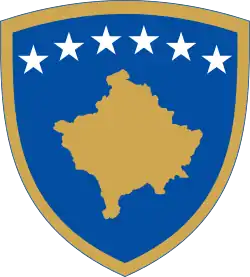Spain's reaction to the 2008 Kosovo declaration of independence
Kosovo's declaration of independence from Serbia was enacted on Sunday, 17 February 2008 by a unanimous vote of the Assembly of Kosovo.[1] All 11 representatives of the Serb minority boycotted the proceedings.[2] International reaction was mixed, and the world community continues to be divided on the issue, with 113 of 193 UN member states recognizing Kosovo's independence. Spain's reaction to the 2008 Kosovo declaration of independence is one of non-recognition, mainly due to concerns about the implications for its own territory.[3] Although it has given indications that its stance may change, increasing political tensions in Catalonia under the independentist-led coalition government will make it unlikely that Spain will soften its current position.
.svg.png.webp) |
|---|
| This article is part of a series on the politics and government of Spain |
 |
|---|
| This article is part of a series on the politics and government of Kosovo |
| Constitution and law |
History
On 18 February 2008, Spanish Foreign Minister Miguel Ángel Moratinos said that Spain would not recognise Kosovo because the declaration of independence did not respect international law. He also said that the independence of Kosovo would only be legal if it was the result of agreement by all sides involved or if there had been a UNSC resolution.[4] Spain will not take part in the EULEX mission until legal questions over how it will replace the UN administration are answered. Moratinos told a meeting of EU Foreign Ministers in Slovenia that Spain will not send its contingent to the EULEX mission until there has been a formal transfer of powers from the UN.[5]
In February 2009, Ambassador of Spain to Serbia Íñigo de Palacio España said that Spain's position not to recognise Kosovo independence "would not change even after the adoption of the resolution by the European Parliament" and that "Most UN members do not recognize Kosovo's independence. Just 54 of 194 have recognized. The EP resolution is not mandatory and was adopted by a narrow majority, which indicated that there was a division within the institution on the issue of Kosovo's independence".[6]
In May 2009 José García-Margallo y Marfil, Spanish member of the EU parliament, said that Spain does not recognise Kosovo because of principles related to Spain's Galicia, Basque, and Catalonia autonomous communities. However he also stressed that these Spanish autonomous communities are not comparable with Kosovo which is fundamentally different. García-Margallo said that despite Spain's non-recognition of Kosovo it will continue to support Kosovo and its development.[7] On 14 May 2009, Juan Fernando López Aguilar, head of the Spanish Socialist Workers' Party (PSOE) list for the European Parliament Elections (and former minister of justice), hinted that Spain might recognise Kosovo in the very long run, referring to the development of relations between Spain and Israel.[8] At the press conference during the 64th Session of the UNGA, the Prime Minister of Spain José Luis Rodríguez Zapatero said that Spain has a consistent position on the question of recognition of the creation of independent States that required the respect of international law and that from Spain's point of view, it was not correct to recognise Kosovo. He stated that Spain will not change its position despite more than 60 countries that recognised and that "the question could be the reverse: why are there more than 100 countries that have not recognized Kosovo and why do those 60 not see what the other 100 see?".[9][10]
In March 2012, during a fierce debate between Spanish Prime Minister Mariano Rajoy and Catalan MP and Convergence and Union spokesman Josep Antoni Duran i Lleida, Rajoy stated that he is opposed to the recognition of Kosovo as this is what suits the interests of Spain.[11]
However, after the arrival of the socialist Pedro Sanchez to the government, the Ministry of Foreign Affairs has stated that "they are working in finding new solutions", especially if an agreement between Serbia and Kosovo is reached.[12]
References
- Kosovo MPs proclaim independence, BBC, 2008-02-17
- Transkript: Nga Seanca Plenare e Jashtëzakonshme Solemne e Kuvendit Të Kosovës Me Rastin e Shpalljes Së Pavarësisë, Të Mbajtur Më 17 Shkurt 2008, Republic of Kosovo Assembly, 2008-02-17 (in Albanian)
- Ferrero-Turrión, Ruth (2020). "The consequences of state non-recognition: the cases of Spain and Kosovo". European Politics and Society. 0 (0): 1–12. doi:10.1080/23745118.2020.1762958. ISSN 2374-5118.
- Spain will not officially recognise Kosovo, News from Spain, 2008-02-18
- Spain Holds Staff From EU Kosovo Mission, Balkan Insight, 2008-03-31
- Spain, Slovakia reject EP resolution, B92, 2009-02-07
- Spanish position visa vi Kosovo, The Kosovo Times, 2009-05-13 Archived February 24, 2012, at the Wayback Machine
- López Aguilar no cierra la puerta a un reconocimiento de Kosovo por España, ABC ES, 2009-05-14
- Press Conference by Spain's Prime Minister José Luis Rodríguez Zapatero, United Nations, 2009-09-23
- Spain Will Not Change Position Against Kosovo Independence, Latin American Herald Tribune
- Rajoy se opone a reconocer Kosovo porque "es lo que conviene al interés general de los españoles", La Vanguardia, 2012-03-14 (in Spanish)
- "El Gobierno español reconoce que Kosovo es una "chinita en el zapato"". La Vanguardia (in Spanish). 2020-02-07. Retrieved 2020-03-12.